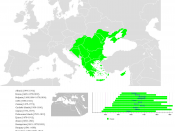By the early 1930s there was every sign that Europe had not recovered from the effects of the First World War. This can be seen in strained diplomatic relationships between many countries within Europe and political turmoil within states brought about by multi-party politics, where no one main party could take control and so was reliant on coalitions of sometimes only very vaguely allied principle parties. The main exponents of diplomatic tensions in central Europe were that of France and Germany and centred on the wrangling over reparation payments by the two countries, although this was by no means the only issue that divided them. This essay will examine the changes that were occurring in these countries and how these changes affected diplomatic relations between them. A number of other European countries such as Italy, Austria, Portugal, Hungary, Poland, Bulgaria, Yugoslavia and Czechoslovakia were also experiencing major, and oft times violent, changes in this period.
An example of one reason why these countries were experiencing problems can be shown in the case of Czechoslovakia. Geographic changes in the boundaries that made up the state of Czechoslovakia meant that a large number of different nationalities lived within this country. Within the boundaries there lived Czechs, Germans, Slovaks, Hungarians and small group of Poles concentrated in the mining district of Teschen. Although formed and run by someone who was seen by many as the ideal democrat, wise, moderate and far seeing, Thomas Masaryk, President from 1918 to 1935 had the hard task of trying to bring unity to a country that was made up of fragments of peoples, in much the same way as other countries had to bring unity to the fragments and divisions that existed within their political systems. It will be concluded that the rise in Europe of dictatorial...


